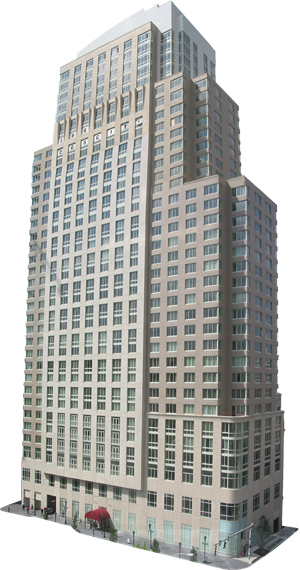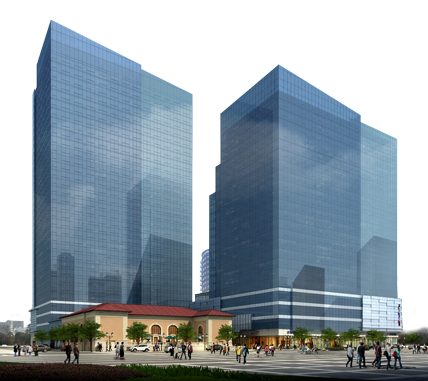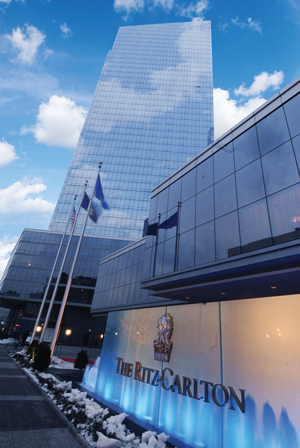Louis Cappelli was not going to be outdone.
In the mid-2000s, as the suburban developer was building Trump Plaza, a high-rise condo in downtown New Rochelle, he learned that a rental building going up around the corner, Avalon on the Sound East, was going to be taller.
Not just taller. It would have been Westchester’s tallest building.
So Cappelli, a frequent business partner and friend of President-elect Donald Trump, decided to add an extra floor to the Trump building to make it 40 stories, even though that meant revising plans and other added costs, according to an account shared by people close to the project that the developer confirmed.
For those who have worked with Cappelli, or who have been his rivals through the years, the move had all the hallmarks of a typical Cappelli undertaking — competitive, unsubtle and landscape-altering, which may be par for the course in New York City but less so in its bedroom communities.
“He is brash and has a level of confidence that people aren’t really used to,” said Arthur Collins, president of Collins Enterprises, a Stamford-based developer who has vied with Cappelli for development sites in Yonkers. “But he is a big thinker and a strong performer in what he does.”
But he has had serious setbacks. The recession derailed some big plans, like an ambitious mixed-use superproject in Yonkers focused around a 6,500-seat baseball stadium. Other undertakings have led to court fights.
Recently, Cappelli has cashed out of most of his holdings and stepped out of the development limelight. Though his construction business is active, he has no major development projects in Westchester currently underway, though he says two are planned.
Both friends and rivals agree that Cappelli’s imprint on the skylines of Westchester’s cities is substantial and impressive. Once-desolate sections of Yonkers, White Plains and New Rochelle have turned into the lively, transit-oriented residential hubs that Cappelli envisioned years ago.
 “Without his vision, to get these projects going, it’s hard to imagine what these downtowns would look like today,” said Robert Fonte, a real estate lawyer who once sued Cappelli for $11.2 million over an alleged failure to make payments for the purchase of a New Rochelle apartment building. The suit was ultimately settled.
“Without his vision, to get these projects going, it’s hard to imagine what these downtowns would look like today,” said Robert Fonte, a real estate lawyer who once sued Cappelli for $11.2 million over an alleged failure to make payments for the purchase of a New Rochelle apartment building. The suit was ultimately settled.
Legal tussling aside, Fonte speaks admiringly of Cappelli and his contributions in Westchester. “He’s been very influential,” Fonte said.
Real estate in his veins
If Cappelli understands what will sell in Westchester, it may be because local real estate was likely a frequent topic at the dinner table growing up.
His grandfather, Luca Cappelli Sr., was a carpenter and mason who helped construct an apartment building in the Bronx. His father, Luca Jr., started out as a TV repairman but built his own house in the 1950s, a brick ranch at the end of a cul-de-sac in Yonkers.
And in the late 1960s, his father formed Saturn Construction, which tackled highway and other government projects. Louis, who went to work for the family business after graduating from college in 1973, wanted to take it in a new direction emphasizing housing and office development, and founded Valhalla-based Cappelli Enterprises in 1985.
Cappelli was not the first developer who wanted to upgrade Westchester’s cities. In the late 1990s, global developer Tishman Speyer unveiled sweeping redevelopment plans for the downtown of White Plains but ultimately withdrew the proposal, suggesting it was unworkable. With the backing of the area’s mayors and county executives — and the support of some favorable zoning changes — Cappelli seemed to have an easier time pushing projects across the finish line, according to brokers, developers and local officials.
For his part, Cappelli, who paid Tishman $17 million for the White Plains site four days after the company pulled out of its plans, knew what Westchester needed: New York-style skyscrapers. “Why don’t I bring Manhattan to the suburbs?” said Cappelli, who lived in Manhattan from 1980 to 2012, during which time he reverse-commuted to work. “People wanted a Manhattan-type building, but they didn’t want to live in Manhattan.”
Diving into untested waters
Making multimillion-dollar commitments in untested market is a classic Cappelli move, his fans say. “He’s a gambler. He’s willing to take risks,” said Joseph Apicella, who handled development issues for Cappelli Enterprises from 1997 to 2013.

One City Place in downtown White Plains
Though it may seem obvious in hindsight that people want to put down roots in urban centers and enjoy car-independent lifestyles, such appeal was not so widespread two decades ago, Apicella said.
But places like White Plains were not Cappelli’s first development targets. In fact, during the 1990s he grew frustrated by the protests that erupted over the charge that his Landing at Dobbs Ferry, a 103-unit townhouse condo complex, was sitting on toxic soil, though others say the development’s opponents were really against the dense multifamily development. He ultimately sued the opponents for libel before settling out of court, according to news reports.
“Louis used to say, ‘I want to go where I’m wanted,’” said Apicella, who recalled hearing his boss’s voice bellowing down the hall as he argued with community activists over the phone.
And eventually in Westchester’s cities, he found officials saying, “‘Please come in and help us. We want to rebuild our downtowns,’” said Apicella, who is now the managing director at Pelham-based MacQuesten Development, working on urban infill projects that appear ripped right out of Cappelli’s playbook.
New Rochelle
Kicking off his streak of large, game-changing projects was, in many ways, New Roc City, a $190 million, 1.2 million-square-foot entertainment, retail, hotel and residential complex that replaced a run-down shopping mall in downtown New Rochelle when it opened in 1999.
Topping it is a carnival-like ride called the Space Shot that in warm weather flings strapped-in passengers up a 185-foot spire. With a bowling alley, arcade and 18-hole mini golf course, plus a connected supermarket and apartments, New Roc City helped bring people back into a city that could seem abandoned, said New Rochelle Mayor Noam Bramson.
“It certainly brought life and energy and commerce back to our downtown,” Bramson said, adding that the retail vacancy rate in the 1990s was 50 percent. “It was a tremendous improvement over what had existed previously.”
New Roc City’s luster has faded over the years, yet Cappelli has made out well. Entertainment Properties Trust, a RIET, bought a majority share in the property from Cappelli in 2003, before taking sole ownership in 2010. Likewise, the 194-unit Trump Plaza sold most of its apartments by its opening in 2007. Cappelli hung on to 37 units and rented those out until 2015, when he sold 34 of the apartments and held on to the rest for his family.
These projects gave a sort of stamp of approval in Westchester cities such as New Rochelle, which recently relaxed its zoning approvals process to encourage construction.

Atlantic Station, a Cappelli project planned for nearby Stamford, CT
In late November, a development team led by RXR Realty broke ground on the site of a shuttered movie theater for a 28-story building with apartments and arts spaces that’s expected to be the start of a wave of $4 billion in investment, including 6,000 housing units, according to Bramson.
Convinced that Westchester’s cities needed more density than zoning allowed, Cappelli, a major Republican donor, made impassioned pleas to Westchester city councils to get them to allow bulkier structures, Bramson said.
One result, in White Plains, was a change in zoning in the early 2000s that permitted buildings up to 350 feet tall, whereas 250 feet was the previous limit.
A prime example of how Cappelli took advantage of zoning changes is his City Center at White Plains, a $320 million mixed-use colossus on the former Tishman site that packs in big-box stores, a theater, parking garages and three residential buildings, including Trump Tower, a 35-story, 212-unit beige-brick condo. It opened in 2003 and sold its last unit by 2005, when the condo opened, Cappelli said.
Two years ago, Kite Realty Group Trust purchased City Center’s shopping mall, which includes Target, Nordstrom Rack and ShopRite — stores that were bustling on a recent afternoon — for about $35 million. And Cappelli sold another piece of the complex, One City Place — a 35-story, 311-unit rental building — to a JPMorgan affiliate in 2005.
The vitality of the scene today stands in stark contrast to the early 1970s, when entire blocks in White Plains, the county seat, were fields of rubble, according to photos shared by Ben Himmelfarb, a local librarian and historian.
Though the streetscape had filled in by the 1990s, Macy’s, which used to be at the City Center site, packed up and moved a few blocks away, leaving an empty, hulking site in its wake. Downtown paid the price, Himmelfarb said: “People used to avoid that area because there was nothing there.”
And Alec Roberts, who has been developing affordable housing in White Plains since 1990, doesn’t even remember much market-rate housing in the downtown, which was mostly low-slung. “It was a radical idea at the time to build a high-rise building,” he said.
For all its stature, City Center did have a big follow-up act, Renaissance Square, a $400 million mixed-use project at a former gas station whose centerpiece is a two-towered, dark-colored Ritz-Carlton condo-hotel.
The 185-unit, 43-story first tower was completed and sold out at an average of $1,000 a square foot by 2007, thus avoiding the worst of the Great Recession, said Fonte, the real estate attorney. Cappelli “was very aggressive in getting the Ritz built quickly, before the economy turned,” Fonte said. “Otherwise, he would have been in a very bad position.”

Cappelli lives in the penthouse of this Ritz-Carlton, one of his projects.
Yet finishing and marketing the second 43-story tower, also with 185 units, was so difficult, Cappelli said, he believes it was what caused him to suffer a brain aneurysm on the 11th hole of a Hamptons golf course in 2009. “And I was only two over par, too,” he joked.
Today, the Ritz-Carlton, Westchester’s tallest structure, is still selling sponsor units, with about 10 left a long eight years after marketing began: “I will probably break even,” Cappelli said.
Yonkers
For all Cappelli’s other successes, Yonkers has been a relative struggle. One failure was River Park Center, a $1.8 billion, 4 million-square-foot mixed-use project he planned with a development team. The 6,500-seat baseball stadium was planned to sit on top of stores and be surrounded by high-rise apartments on the site of a poultry market-turned-parking lot called Chicken Island.
Supporters say River Park Center fell victim to slow-moving bureaucracy and then the recession, though in 2012 it was technically still alive. In a promotional video from that year, Cappelli, looking tan and well-coiffed, promised it would be done by 2015, saying, “I’ve got a chance here to leave something behind.” Yonkers terminated its agreement with the development team a year later.
Critics say one reason River Park never panned out was that the baseball field, used for only part of the year, would not be a reliable revenue source. “The stadium was never going to work,” Fonte said. “You need more retail anchors.”
The plan, hatched more than a decade ago, also might have been too far ahead of its time. Then, Yonkers was in the infancy of a revival, but today, the city’s redevelopment is in full gear. Part of the Saw Mill River, which used to run through downtown Yonkers in underground culverts, was uncovered in 2012, and its banks were landscaped to create a downtown park. Two other sections of the river have also been exhumed.
And the cranes are rumbling again. RXR Realty and Rising Development are now at work on a $190 million mixed-use 439-unit development next to one of those newly exposed river sections, among other projects.
At Chicken Island, there are also new signs of life. At the end of 2016, the city once again invited developers to submit proposals. Cappelli said he will have a plan soon. He’s also considering another 300-unit development elsewhere in the city. And LRC Construction, Cappelli’s construction arm, is handling the Yonkers RXR project, as well as another nearby one from LCOR.
Quieter role
In recent years, a longtime dream to build a casino upstate seems to have drawn Cappelli’s attention away from Westchester, friends and colleagues say.
But that dream was ultimately shattered. When Cappelli failed to repay a loan from Entertainment Properties Trust to develop the casino in Monticello, he had to forfeit much of his property there to the trust. The trust ended up partnering with Empire Resorts, a different developer, despite Cappelli’s efforts to block the deal with a lawsuit. And in 2015, that new partnership won a coveted license from the state to build Montreign Resort Casino, an 18-story, 80,000-square-foot casino with 2,150 slot machines.
Cappelli, 65, is married to Kylie Travis, a former actress he was introduced to at an Atlantic City boxing match. Today he lives in a penthouse with Manhattan views at his White Plains Ritz-Carlton.
With Trump heading into office, questions about his friendship with the president-elect — as well as comparisons between the two — abound, but for now, Cappelli is staying mum about the relationship. He declined to comment on whether Trump invited him to his inauguration. But the comparisons persist. “He loves tall buildings and kind of came in with the Trump mentality about having the grandest buildings in town,” said Gregory Merchant, the owner of Investment Design Properties, a New Rochelle-based commercial real estate firm, who occasionally lunches with Cappelli at the Ritz-Carlton’s cafe.
But the comparison, he said, goes only so far. Relative to Trump, Cappelli “is not braggadocious at all,” Merchant said. “He’s actually very humble.”
